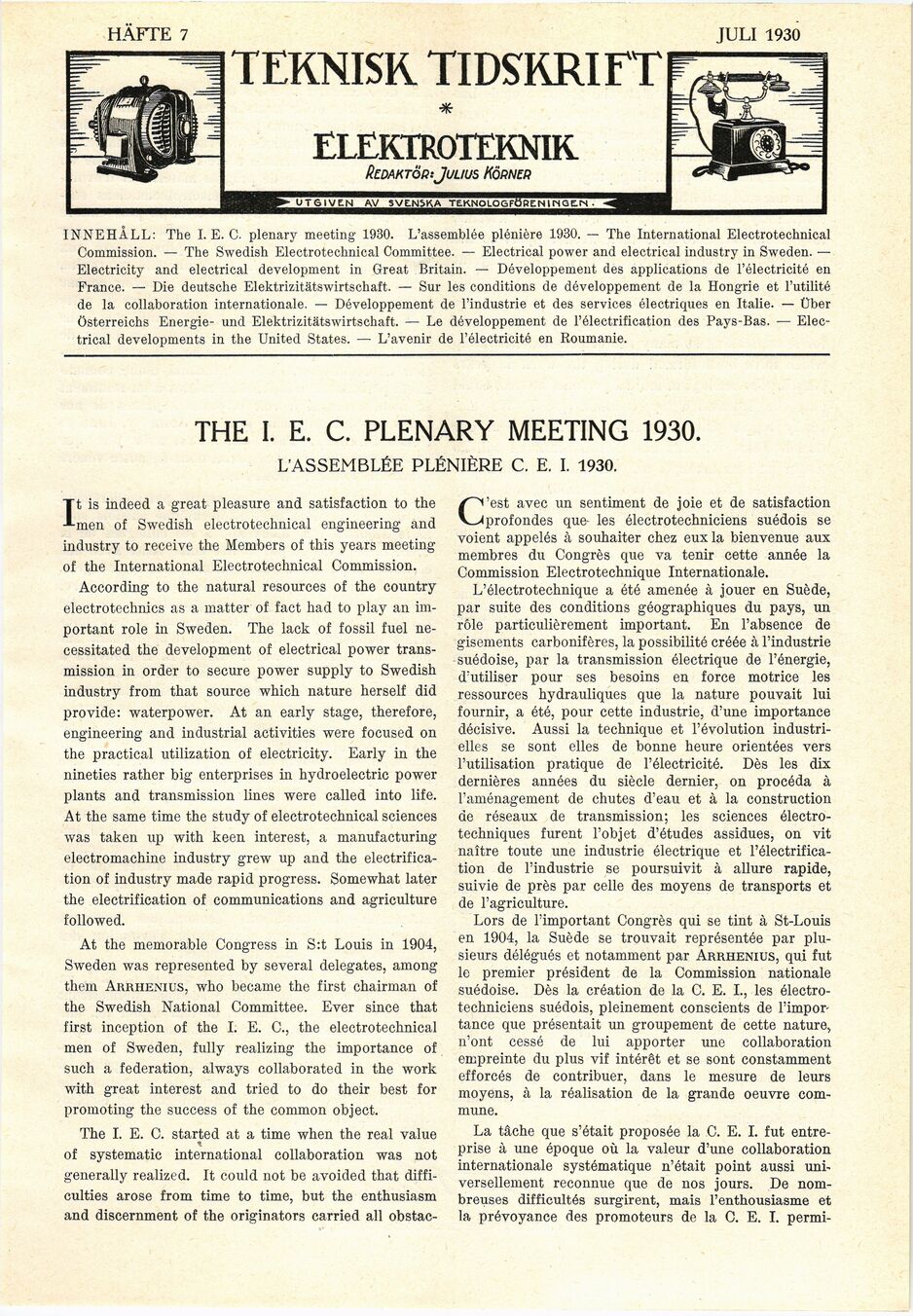
Full resolution (JPEG)
- On this page / på denna sida
- Sidor ...

<< prev. page << föreg. sida << >> nästa sida >> next page >>
Below is the raw OCR text
from the above scanned image.
Do you see an error? Proofread the page now!
Här nedan syns maskintolkade texten från faksimilbilden ovan.
Ser du något fel? Korrekturläs sidan nu!
This page has never been proofread. / Denna sida har aldrig korrekturlästs.
HAFTE 4
TEKNISK TIDSKRIFT
APRIL 1930
*
ELEKTROTEKNIK
Redaktör :Juuus Körner
INNEHÅLL: The I.E. C. plenary meeting 1930. L’assemblée plénière 1930. — The International Electrotechnical
Commission. — The Swedish Electrotechnical Committee. — Electrical power and electrical industry in Sweden. —
Electricity and electrical development in Great Britain. — Développement des applications de l’électricité en
France. — Die deutsche Elektrizitätswirtschaft, — Sur les conditions de développement de la Hongrie et l’utilité
de la collaboration internationale. — Développement de l’industrie et des services électriques en Italie. — Über
Österreichs Energie- und Elektrizitätswirtschaft. — Le développement de l’électrification des Pays-Bas. —
Electrical developments in the United States. — L’avenir de l’électricité en Roumanie.
THE I. E. C. PLENARY MEETING 1930.
L’ASSEMBLÉE PLÉNIÈRE C. E. I. 1930.
It is indeed a great pleasure and satisfaction to the
men of Swedish electrotechnical engineering and
industry to receive the Members of this years meeting
of the International Electrotechnical Commission.
According to the natural resources of the country
electrotechnics as a matter of fact had to play an
important role in Sweden. The lack of fossil fuel
necessitated the development of electrical power
transmission in order to secure power supply to Swedish
industry from that source which nature herself did
provide: waterpower. At an early stage, therefore,
engineering and industrial activities were focused on
the practical utilization of electricity. Early in the
nineties rather big enterprises in hydroelectric power
plants and transmission lines were called into life.
At the same time the study of electrotechnical sciences
was taken up with keen interest, a manufacturing
electromachine industry grew up and the
electrification of industry made rapid progress. Somewhat later
the electrification of communications and agriculture
followed.
At the memorable Congress in S:t Louis in 1904,
Sweden was represented by several delegates, among
them Arrhenius, who became the first chairman of
the Swedish National Committee. Ever since that
first inception of the I. E. C., the electrotechnical
men of Sweden, fully realizing the importance of
such a federation, always collaborated in the work
with great interest and tried to do their best for
promoting the success of the common object.
The I. E. C. started at a time when the real value
t
of systematic international collaboration was not
generally realized. It could not be avoided that
difficulties arose from time to time, but the enthusiasm
and discernment of the originators carried all obstac-
C’est avec un sentiment de joie et de satisfaction
profondes que- les électrotechniciens suédois se
voient appelés à souhaiter chez eux la bienvenue aux
membres du Congrès que va tenir cette année la
Commission Electrotechnique Internationale.
L’électrotechnique a été amenée à jouer en Suède,
par suite des conditions géographiques du pays, un
rôle particulièrement important. En l’absence de
gisements carbonifères, la possibilité créée à l’industrie
-suédoise, par la transmission électrique de l’énergie,
d’utiliser pour ses besoins en force motrice les
ressources hydrauliques que la nature pouvait lui
fournir, a été, pour cette industrie, d’une importance
décisive. Aussi la technique et l’évolution
industrielles se sont elles de bonne heure orientées vers
l’utilisation pratique de l’électricité. Dès les dix
dernières années du siècle dernier, on procéda à
l’aménagement de chutes d’eau et à la construction
de réseaux de transmission; les sciences
électrotechniques furent l’objet d’études assidues, on vit
naître toute une industrie électrique et
l’électrification de l’industrie se poursuivit à allure rapide,
suivie de près par celle des moyens de transports et
de l’agriculture.
Lors de l’important Congrès qui se tint à St-Louis
en 1904, la Suède se trouvait représentée par
plusieurs délégués et notamment par Arrhenius, qui fut
le premier président de la Commission nationale
suédoise. Dès la création de la C. E. I., les
électro-techniciens suédois, pleinement conscients de
l’importance que présentait un groupement de cette nature,
n’ont cessé de lui apporter une collaboration
empreinte du plus vif intérêt et se sont constamment
efforcés de contribuer, dans le mesure de leurs
moyens, à la réalisation de la grande oeuvre
commune.
La tâche que s’était proposée la C. E. I. fut
entreprise à une époque où la valeur d’une collaboration
internationale systématique n’était point aussi
universellement reconnue que de nos jours. De
nombreuses difficultés surgirent, mais l’enthousiasme et
la prévoyance des promoteurs de la C. E. I. permi-
<< prev. page << föreg. sida << >> nästa sida >> next page >>
Project Runeberg, Fri Oct 18 15:26:24 2024
(aronsson)
(download)
<< Previous
Next >>
https://runeberg.org/tektid/1930e/0125.html



